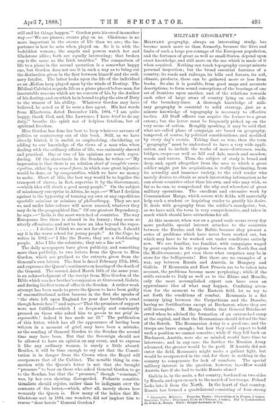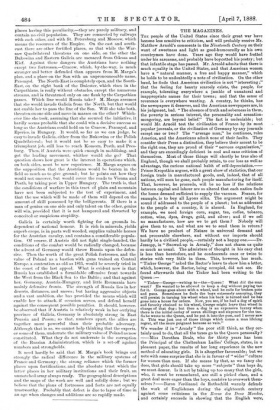MILITARY GEOGRAPHY.* MILITARY geography, always an interesting study, has become
much more so than formerly, because the lives and limbs of such a large per-centage of the European population,. and the fortunes of great as well as small States, depend upon exact knowledge, and still more on the use which is made of it when acquired. Nothing can teach topography except minute personal inspection; but the broad essential features of a country, its roads and railways, its hills and forests, its soil,. climate, products, these can be gathered more or less from books. So also it is possible, from good maps and accurate descriptions, to form sound conceptions of the bearings of one set of frontiers upon another, and of the relations towards- each other of large areas of country lying on each side of the boundary-lines. A thorough knowledge of mili- tary geography is essential to solid strategy, just as a minute knowledge of topography is necessary to effective tactics. All Staff officers can acquire the former to a great extent; but the latter must be frequently picked up on the very scene of action. Roughly speaking, it may be said that what are called plans of campaign are based on geography, tempered, of course, by political considerations, and modified by every day's events. Taking that as true, then the term " geography " must be understood to have a very wide appli- cation, and to include the works of man—fortresses, roads, bridges, crops—as well as hill and dale, marsh and meadow, woods and waters. Thus, the subject of study is broad and deep, and, apart altogether from the uses to which a great soldier might put his acquisitions, is really fascinating, from its actuality and immense variety, to the civil reader who merely desires to obtain as much interesting information as he can about countries other than his own, and who may wish, so far as he can, to comprehend the why and wherefore of great military operations. The excellent and extensive work by Commandant Marga, which covers wide fields, will materially help such a student or inquiring reader to gratify his desire. It deals with geography from the soldier's standpoint; but, as we have said, the term is very comprehensive, and takes in much which should have attractions for all.
At this moment, when war on a grand scale seems every day more probable, special interest attaches to the countries between the Euxine and the Baltic, because they present a series of problems which have never been worked out, but which may have to be worked out under conditions entirely new. We arc familiar, too familiar, with campaigns waged by great captains in the regions between the North Sea and the Mediterranean ; yet even there what surprises may be in store for the belligerents! But there are no examples of a war, say between Russia and Austria, in Hungary and Galicia. If Roumania and East Prussia are to be taken into account, the problems become more perplexing ; while if the strife extends to Italy as well as to the Rhine and Moselle, only the most accomplished expert can have even an approximate idea of what may happen. Confining atten- tion for the moment to the Eastern field, let us try to set forth the conditions of combat. Roumania is a fiat country lying between the Carpathians and the Danube, having no fortifications except at Bucharest, where they are still incomplete. M. Marga thinks that General Brialmont erred when he advised the formation of an entrenched camp at the capital, and that the Roumanians should defend the line of the Sereth. The Roumanian Army is a good one, and the troops are brave enough ; but how they could expect to hold such a position we cannot conceive ; while if they fell back on Bucharest, Austria, were she so minded, would have time to intervene ; and in any case, the further the Russian Army advanced, the greater would be its peril. If Austria did not enter the field, Roumania might make a gallant fight, but would be overpowered in the end, for there is nothing in the country to compensate for lack of numbers. The special military interest in the question, however, is,—How would Austria fare if she had to tackle Russia alone ?
Galicia is, in the main, a fiat country, bordered on two sides by Russia, and open on each to the march of her troops. Poland looks into it from the North. In the heart of that country, Russia has formed a quadrilateral consisting of four strong • Geographic Militaire. Premiere Partie Generalites et la France, 2 tomes. Deuxiiane Partie: Principana Etats de PEurope, 3 tomes. Par le Commandant do Genie A. Marge. Pans: Berger-Levrault et the.
places having this peculiarity,—they are purely military, and contain no civil population. They are connected by railways with each other, and with St. Petersburg and Moscow, which means the resources of the Empire. On the east and south- east there are other fortified places, so that while the War- saw Quadrilateral threatens on one side, on the other the Bukowina and Eastern Galicia are menaced from Odessa and Kief. Against these dangers the Austrians have nothing except two fortresses,—Cracow, which, by-the-way, is much stronger and better defended than appears from M. Marga's plan, and a place on the San with an unpronounceable name, Przemysl. The North-East is completely open, and the South. East, on the right bank of the Dniester, which rises in the Carpathians, is really without obstacles, except the numerous streams, and is threatened only on one flank by the Carpathian passes. Which line would Russia take ? M. Marga assumes that she would invade Galicia from the North, but that would not enable her to pass the line of the San. Will she take both, threaten on one side and move in masses on the other? Which- ever line she took, assuming that she secured the initiative, it hardly seems probable that she could win a decisive success so long as the Austrians could hold on to Cracow, Przemysl, and Eperies, in Hungary. It would, so far as we can judge, be easy to invade Galicia, either from the Bukowina or the Polish Quadrilateral ; but it would not be so easy to make it a triumphant job, still less to reach Komorn, Pesth, and Pres- burg. Then, if Austria were quick enough in mobilising, and got the leading movement, whither would she go? That question shows how great is the interest in operations which, on both sides, must be new experience. M. Marge, argues on the supposition that the Austrians would be beaten in the field so much as to give ground ; but he points out how they would not uncover, but would cover the roads to Vienna and Pesth, by taking post in Upper Hungary. The truth is, that the conditions of warfare in this tract of plain and mountain have not been subjected to the test of experiment, and that the use which will be made of them will depend on the amount of skill possessed by the belligerents. If there is a man of genius on one side and only talent on the other, genius will win, provided that it is not hampered and thwarted by conceited or suspicious stupidity.
Galicia is certainly worth fighting for on grounds in- dependent of national honour. It is rich in minerals, yields superb crops, is in parts well wooded, supplies valuable horses for the Austrian cavalry, and contains a considerable popula- tion. Of course, if Austria did not fight single-handed, the conditions of the combat would be radically changed, because the advent of Germany would throw Russia upon the defen- sive. Then the worth of the great Polish fortresses, and the value of Poland as a bastion with guns trained on Central Europe, a contention as old as 1815, would be severely tried in the court of the last appeal. What is evident now is that Russia has established a formidable offensive front towards the West from the Black Sea to the Baltic ; and that against her, Germany, Austria-Hungary, and little Roumania have mainly defensive fronts. The strength of Russia lies in her deserts, distances, and snows ; but having aggressive objects and a vast ambition, she has provided the means which will enable her to attack, if occasion serves, and defend herself against the consequent possible penalties. It should, however, be observed that if Austria is relatively weak in her outlying province of Galicia, Germany is absolutely strong in East Prussia and Posen; so that, numbers apart, the allies are together more powerful than their probable adversary. Although that is so, we cannot help thinking that the experts, or some of them, underrate the military value of Poland as now constituted. What they do not underrate is the corruption of the Russian Administration, which is a set-off against numbers and strongholds.
It need hardly be said that M. Marga's book brings out strongly the radical difference in the military systems of France and Germany ; the strong reliance which the former places upon fortifications, and the absolute trust which the latter places in her military institutions and their fruit, an unmatched army always ready. The geographical descriptions and the maps of the work are well and solidly done ; but we believe that the plans of fortresses and forts are not equally trustworthy. Probably that defect is due to lapse of time in an age when changes and additions are so rapidly made.



































 Previous page
Previous page